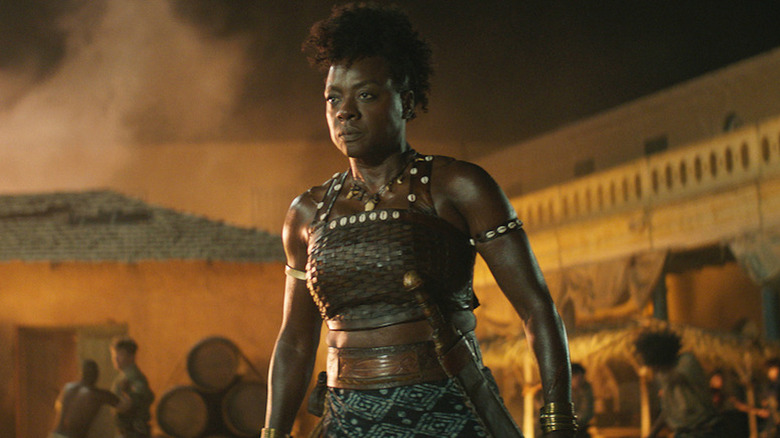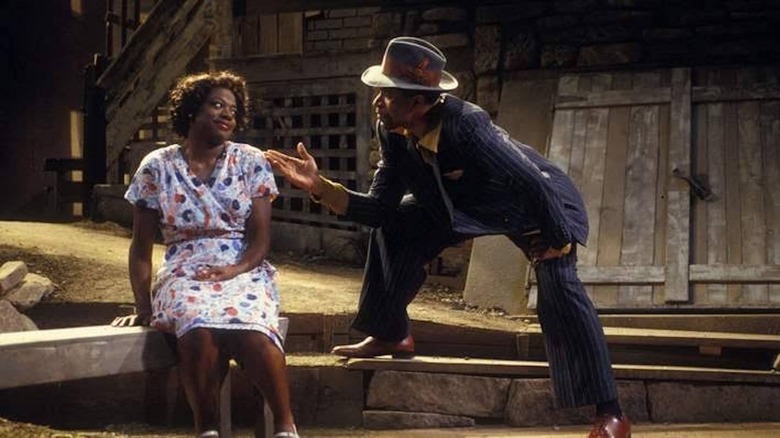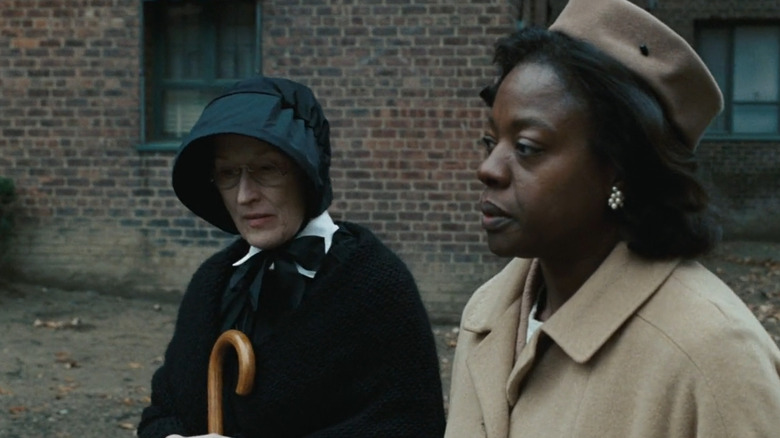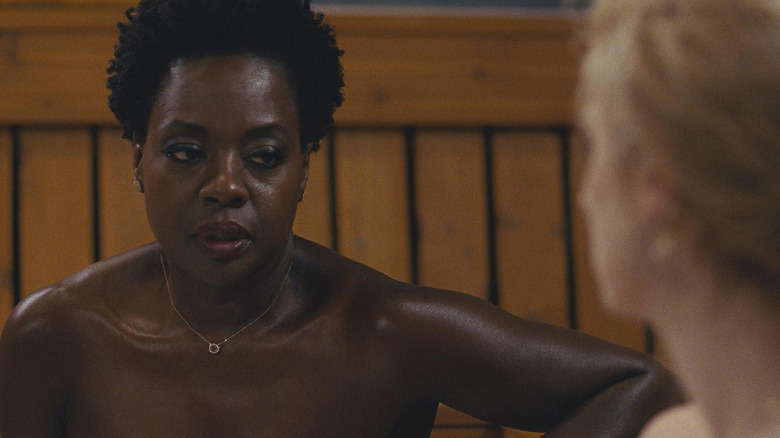Viola Davis Is The Best Actor Ever
All you need to do to understand the animating injustice of Viola Davis's career is scan through her Wikipedia biography, and note the puzzling dynamic of going from Tony-winning leads on Broadway in the late 1990s and early 2000s to, at best, supporting turns in studio movies. How was this Juilliard-trained dynamo who routinely set New York City stages ablaze getting relegated to undernourished roles in films starring actors she could dust straight off the screen?
If you're at all aware of how things work in the United States of America, you know the answer. Davis certainly does, and she shouted it from the mountaintop at a Woman in the World event in 2018:
"I have a career that's probably comparable to Meryl Streep, Julianne Moore, Sigourney Weaver. They all came out of Yale; they came out of Julliard; they came out of NYU. They had the same path as me. And yet I am nowhere near them, not as far as money, not as far as job opportunities — nowhere close to it."
While Davis is now, at the age of 57, one of the most celebrated actors on the planet, you can't help but fume that she was denied stardom in her thirties because the number of lead roles for African-American women were severely limited. Beyond Halle Berry, Angela Bassett and Whitney Houston, Hollywood wasn't trying to elevate female performers of color — in large part because there weren't many writers and directors of color, of any gender, making movies.
Though Davis is at long last getting mentioned in the same breath as Streep, Moore and Weaver, the vast majority of moviegoers missed out on some of her best work. And this is because most of it wasn't done in front of a camera.
The breakout
Timing is everything in life, and I was fortunate enough to move to New York City in 1996 for an internship at the Circle Repertory Company. Working as a literary assistant at this Off-Broadway theater placed a wide-eyed Ohio kid in close proximity to entertainment legends. When I arrived at the office for my first day of work, I found myself face-to-face with Eli Wallach, who was renting a rehearsal space to workshop a play. On my second day, the theater's artistic director, Austin Pendleton, gave me his tickets for that evening's Broadway performance of August Wilson's "Seven Guitars." I couldn't believe my good fortune. Ruben Santiago-Hudson had just won the Tony for Best Featured Actor in this show, but I was especially keen to see the great Keith David in the lead role.
I stumbled out of the Walter Kerr Theater dazed by the brilliance of Viola Davis.
As Vera — a Pittsburgh spitfire desperate to believe her just-paroled, blues-singing lover has mended his wicked ways — Davis owned every inch of the stage. Vera is the anchor of the show, and despite having never seen Davis nor heard of her before, I was captivated by her strength and sensuality. David was a gigantic presence, while Santiago-Hudson, as an ornery harmonica player, undercut his size with a shifty viciousness. But while Santiago-Hudson had the stand-out assignment of knocking the star off balance, Davis expressed the widest range of emotions: sorrow, joy, lust, fury. Lloyd Richards' staging left little doubt as to which performer he prioritized. Vera may not be the protagonist of "Seven Guitars," but she was our surrogate.
I've seen some of the greatest actors of all time slay on stage, folks like Derek Jacobi, Jeffrey Wright and Philip Seymour Hoffman. I've never seen anything that touches Viola Davis' performance in "Seven Guitars."
The career
Okay, that's not entirely true. I saw Viola Davis in August Wilson's "King Hedley II," the penultimate chapter of his "Pittsburgh Cycle." Though this is probably the weakest installment in Wilson's series, Davis, once again cast as the put-upon lover of a hubristic man (Brian Stokes Mitchell), breathed fire as a woman broken by the meaningless violence that has destroyed her neighborhood. The play is operatic in grand and discordant ways, but if you give Davis an aria, you know you're getting gold.
"King Hedley II" premiered on Broadway in 2001, three years after Steven Soderbergh demonstrated exquisite taste by giving Davis a small role in "Out of Sight." He knew what was up, as did Todd Haynes and Denzel Washington, who cast her in pivotal roles in, respectively, "Far From Heaven" and "Antwone Fisher." I was thrilled to see Davis getting her due, but this wasn't enough, not by a damn sight. In 2006, Oliver Stone cast her as a nameless "Mother in Hospital" in his cowardly "World Trade Center." She'd won a Tony for "King Hedley II," and was worshiped in theatrical circles. She was a decade out from her breakthrough in "Seven Guitars," and she was getting thrown scraps by the movie industry.
Hollywood didn't come to its senses until John Patrick Shanley's "Doubt," where Davis shredded our hearts as an anguished mother whose gay son has been shielded from abuse by his alleged abuser. Davis went toe-to-toe with Streep, and emerged with a performance that earned her an Academy Award nomination for Best Supporting Actress. This should've been her big-screen breakthrough, but she got shunted right back to thankless, periphery parts in movies like "State of Play," "Knight and Day" and "Eat Pray Love."
Davis received her first Best Actress nomination in 2011 for her portrayal as a domestic servant in "The Help," but while she's spectacular in the part, Tate Taylor's film plays like a relic from the 1960s. Why was Davis stuck in the kind of problem picture that felt stale during Sidney Poitier's prime?
Where was the fire and sensuality that she unleashed on the stage?
The defining performance
After knocking out a trio of heavy dramas in "Hunger," "Shame" and "12 Years a Slave," British director Steve McQueen decided to have a bit of genre fun in 2018 with an Americanized remake of the ITV miniseries "Widows." The script he co-wrote with Gillian Flynn was crackerjack enough to attract the formidable likes of Colin Farrell, Liam Neeson, Robert Duvall and Daniel Kaluuya, but the stars of the show are Michelle Rodriguez, Cynthia Erivo, Elizabeth Debicki, and Davis.
Davis' Veronica Rawlings is in mourning after her criminal husband (Neeson) is killed during a botched heist. When she learns that he left behind a detailed plan to steal $5 million from a wealthy Chicago alderman, she enlists the assistance of the widowed associates of her husband to carry out the job.
McQueen's film is a masterfully paced crime flick, but it acquires a righteous heft thanks to Davis' performance. Veronica didn't ask to be placed in this position, and didn't realize the extent of her seemingly deceased husband's treachery. In flashback, we experience not just the depth of her love for her husband, but the eroticism. It's bizarre that this needs to be singled out, but, finally, Davis is playing a fully formed romantic lead, and she is on absolute fire. The only drawback to Davis' casting is that she might be too formidable, but her Veronica is tender and broken and, at times, in way over her head.
How any self-respecting filmmaker could walk out of "Widows" and not want to exploit these qualities is both bewildering and par for the Hollywood course. Thank god Gina Prince-Bythewood filled this void with "The Woman King," but the Academy deemed the film wholly unworthy of a nomination.
I look at Viola Davis, and I see one of the greatest actors of all time. I look at her career, and I want to burn Hollywood all the way to the goddamn ground.



